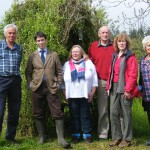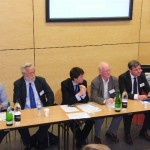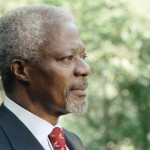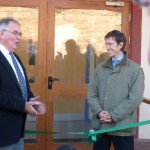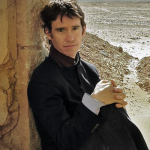Published in The Guardian 14.11.12
Kofi Annan has published a memoir, four years after stepping down as secretary general of the UN. It is difficult to think of anyone in public policy who has been more celebrated. He has already been given awards for “courage” (the JFK Memorial Museum), for “freedom” (the University of St Gallen), and for “international justice” (the MacArthur Foundation); prizes for “security, and development”, for “culture, science and education”, and even for the “protection of human rights, the defence of pluralist democracy and north-south partnership and solidarity”. The governments of Germany, Britain, Portugal, Austria, the Netherlands, Romania and Ghana have pinned medals on his chest. And he has won the Nobel peace prize.
This brings the temptation to be snide. Does his assiduous attendance at more than 70 award and honorary doctorate ceremonies not imply a certain vanity? His membership of so many grand international boards a measure of self-importance? Are there not things even more troubling in his career: the scandal of his son’s involvement in the UN’s oil-for-food programme? Or the catastrophes that happened on his various watches at the UN: Srebenica, Somalia, Darfur – and above all, Rwanda?
General Dallaire, the UN commander in Rwanda, asked permission to seize a Hutu arms cache in January 1994, and thus pre-empt plans for mass killing in the capital. Dallaire and many others believe that such early action might have prevented a genocide. Annan’s office ordered Dallaire not to act; and Annan, then in charge of peacekeeping operations at the UN, decided not to pass on his request to the security council. To his credit, Annan does not duck this issue in his memoir. He carefully prints Dallaire’s call for assistance. He does not try to discredit Dallaire, but instead praises his moral courage and his decision to stay behind when his troops had been withdrawn. He admits that the UN “had no genuine, deep expertise on the country”. And he accepts responsibility for not contacting the security council. But having made the case against himself, Annan does not apologise. Nor does he blame a lack of international will to intervene.
Instead, he argues that there was no reason for the UN to share Dallaire’s fears. “In our analysis [Rwanda] seemed to exhibit none of the risks that caused the disaster in Somalia or the continuing problems in Bosnia … We were not alone in our optimism … right up to March 1994” – a month before the genocide began – “reports were still being written by international development agencies, praising Rwanda as an unusual success story.” Dallaire’s proposal, he argues, was irresponsible, risking a confrontation that could have cost the lives of the entire UN force. He implies that the genocide was unpredictable, going far beyond anything Dallaire forecast, “at a rate and intensity none of us had ever heard of before”. This is not a comfortable series of claims. It questions the consensus that in Rwanda there was warning, the capacity to act, and the clear opportunity to act justly, potentially saving hundreds of thousands of lives. Annan’s views on this and other interventions reflect a distinctive worldview.
He is not uncomfortable with western foreign policy or the idea of intervention. Indeed, he presents himself as a champion of the “legitimacy and necessity of intervention in the case of gross violations of human rights”. He shares in the fears and preoccupations of the post-9/11 leaders. He supports interventions, such as that in Kosovo, that occur without UN security council sanction. He worked comfortably alongside the US-led coalition in Afghanistan and – less comfortably – in Iraq.
Annan may doubt the competence of western powers, but he does not generally attack their intentions. Even his criticisms of the Iraq war focus largely on the lack of due process and post-war planning. He does not emphasise the senseless, unstoppable, irrational momentum of such interventions or the bankrupting scale of our human and financial investments in both places (in each case more than 250,000 soldiers and civilians, and over $100bn a year).
His ease with western foreign policy, however, is matched by a pessimism about countries in conflict. Take his attitude to the success in Bosnia. Eighteen years have now passed since the siege of Sarajevo was ended. All the major war criminals have died or been prosecuted; not only is there no war, but the crime rate in Bosnia is lower than in Sweden. This was made possible because the US armed and trained the Croat army, put the responsibility for the atrocities on Milosevic, and then bombed the Bosnian Serbs. But Annan cannot resist reminding us that “the Croatian … brutality matched many of the atrocities committed across the border in Bosnia.” In so doing he risks associating himself with the many other senior figures who argue that there was fault on all sides and that the violence was the result of “centuries of ethnic hatred”. He is reluctant to do the one thing needed for success in Bosnia: to pick sides.
Curiously for the head of an institution that is condemned to operate with half-measures, he does not emphasise the many options that lie between inaction and over-involvement. In Rwanda, as in Afghanistan and indeed in Bosnia, the near impossibility of a foreign power building a state in the face of an armed insurgency did not mean there was nothing to be done. The best chance may have lain in a more moderate approach. Thus in Afghanistan the best policy was not surge or withdrawal but a lighter and longer-term engagement. In Rwanda, something might have been achieved by small measures such as jamming radio signals: research shows an astonishing amount of the genocide was coordinated through the radio, and implies that without radio, it would have been difficult to kill so completely and rapidly. Annan does not dwell on such things.
Such ease with western intentions, pessimism about countries in conflict, and lack of focus on partial measures, reflects his professional formation, as much as his character. As with many of the most successful heroes of the international stage (Richard Holbrooke is another) less than four of his 40 years in the UN was spent actually working and living in the developing world. He began as a budget officer in Geneva, and rose in the administration to become head of human resources and then head of finance in New York. He was never given the opportunity to serve long years as a field officer, or to develop a deep, engaged knowledge of the culture, history or politics of a particular place. Instead, he was rapidly drawn into the thin atmosphere of multilateral plans.
The idea of Annan as a heroic world-changer continues to be very useful to many institutions. He is now one of the “Elders”: an elite of 10, financed by Richard Branson, to resolve the conflicts in Israel-Palestine, Cyprus, Sudan, Zimbabwe, Sri Lanka, and North Korea. He is president of the Global Humanitarian Forum. And he is founder of the Kofi Annan Foundation. He provides what universities want their public policy students to hear; what committees are looking for in prize-recipients; and most recently what the international community thought it needed in Syria. But in fact, Annan and the other “global leaders” at his level are unlikely to deliver the kinds of change our institutions require. Truly transformational change relies on exactly the reverse of Annan’s worldview. It requires optimism about local capacity, and scepticism about the role of the international community. It is more likely to emerge from immersion in the history, the desires, the strengths, and the imagination of a particular culture. In short, change, like politics, is local. Gandhi or Mandela did not forge their reputation and legacy by moving between four continents, a dozen conflicts and fifty conferences, but by staying home.
Annan has been an impressive UN secretary-general: considerate, charming and prudent. He has produced a book which, like its author, is well-organised, unaggressive and elegant, with glimpses of an attractive hinterland. But his life could have been different. In November 1974 he returned to Ghana to work as a civil servant, but faced with “a debilitating combination of stultifying corruption and bureaucratic inefficiency” he resigned. “I realised that for me, working with the UN was the best way to serve my country and my continent.” Most of us would have been tempted to feel the same. But was he right?
• Rory Stewart is co-author of Can Intervention Work? published by WW Norton.




